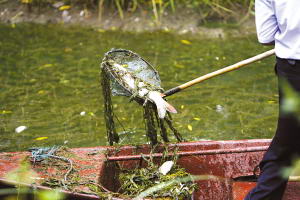| Home / Environment / News | Tools: Save | Print | E-mail | Most Read |
| Dead Fish at Yuanmingyuan Raises Environment Concern |
| Adjust font size: |
Thousands of fishes were found dead in a river at Beijing's old Summer Palace, known to locals as Yuanmingyuan Park, over the weekend, warning the city of its environment worries ahead of next year's Olympic Games. Nearly 10,000 dead fish were seen floating in a 200-meter long river that flows into the "Sea of Happiness", a 28-hectare artificial lake thus named to pray the emperors may live happily till "all the seas gone dry".
The river has become stinky since Saturday with dead crucian carps. The bigger ones are as big as an adult's palm and the smallest ones are about the size of the thumb. "I used to raise fishes in our village pond and I know it couldn't be a coincidence for so many fishes to die all at once," said a tourist who gave only his family name as Gao. He suspected the river water had been polluted. "The fishes will die out in a day or two if the river is not treated." No dead fish has been spotted yet in the main lake. A forestry worker at the park said they had sprayed pesticide on trees on the river bank last week. "Probably we used too much pesticide and poisoned the fish," he said on condition of anonymity. Yet dead fishes are also found along dozens of meters in another river in the northern areas of the park, though no plants are seen anywhere near the river. A worker at Yuanmingyuan's management office said they were seeing into the matter and would expect "relevant departments" to help investigate. Yuanmingyuan, the emperor's private garden founded in the early 18th century and once known as "Versailles of the East", was first overrun by British and French infantry in 1860. What survived that attack was largely ravaged in 1900 by an invasion force of soldiers from eight foreign countries. The park, built on the ruins of the former garden as a reminder of foreign aggression, was in the spotlight two years ago for putting membranes at the bottom of its lake to keep water from seeping out during drought periods. Yet the membranes were criticized of having killed lakebed wildlife and stopped the flow of groundwater and the top environment agency ordered park management to remove them. Beijing authorities are going all-out to improve the city's water and air quality for next year's Summer Games yet the challenge remains tough. The city faces grave water supply problems as four of its 21 reservoirs have dried up, according to a report released by the municipal environment protection bureau last year. Meanwhile, nearly half of Beijing's sightseeing lakes and ponds are so polluted their water cannot even be used to irrigate the park landscape that surrounds them. The report said water quality in seven of Beijing's lakes, such as the Winter Palace Lake and Taoranting Lake, can be used only for irrigation. Only four lakes could be used to supply drinking water, while water from the other lakes is only fit for industrial use. Beijing plans to invest 12.46 billion yuan (US$1.59 billion) between 2006 and 2010 to curb worsening water pollution and guarantee clean water supply. The city with 16 million people conducted a four-day experiment on August 17-20 to test whether pulling 1.3 million cars off its roads each day would prove effective in reducing air pollution during the Games. Experts say pulling 1.3 million motor vehicles off the roads in Beijing each day can reduce exhaust emissions by 40 percent. (Xinhua News Agency August 27, 2007) |
| Tools: Save | Print | E-mail | Most Read |
 |
| Related Stories |

